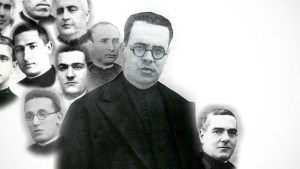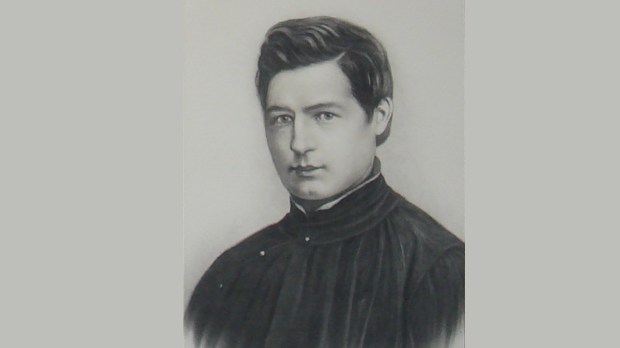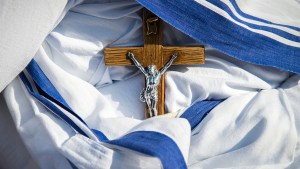Some saints obtain everything from God, because they give Him everything in return. Such is the case of St. Théophane Vénard who never asked for more than one grace: that of martyrdom.
Jean Théophane Vénard was born in Saint-Loup-sur-Thouet, in the Deux-Sèvres (western France), on November 21, 1829, the feast of the Presentation of Our Lady in the Temple.
Even though Saint-Loup boasts of being the distant homeland of Voltaire, since it is there that the Arouët family once took root, the people were pious. The parish priest, Fr. Moineau, distributed the Annals of the Propagation of the Faith, a bulletin that reported both the progress of evangelization throughout the world and what it cost the missionaries in suffering and blood to bring the message of Christ to these distant lands.
The Far East Missions, in particular, were often a one-way ticket to martyrdom. There, the life expectancy of the young priests of the Foreign Missions of Paris didn’t exceed five years: the harsh climate, tropical diseases, difficult living conditions, and persecution doomed these young men to a premature death. Sometimes it was bloody and glorious, but more often it was slow, painful, obscure, and solitary—enough, it would seem, to discourage young men from risking the adventure.
However, the opposite happened; the death of each of these young priests, through the mystery of the communion of saints, gave birth to 10 vocations.
A terrible shock
Tonkin, Vietnam, was a place that didn’t mean much to the inhabitants of Saint-Loup, but thanks to the Annals of the Propagation of the Faith, they knew that since the death in 1820 of the very Francophile emperor Gia Long and the dismissal of the Catholic priests who surrounded him, it wasn’t good to be a Christian there.
This was nothing new; for more than two hundred years, the Vietnamese Church — and with her, the evangelizers that France sent — had been suffering for its God. In the year 1838, the news of the execution of one of them (Fr. Jean-Charles Cornay) upset public opinion, which demanded sanctions against Vietnam.
Nevertheless, it wasn’t reprisals that little Théophane dreamed of when he read the life of this priest, who was also from Poitou. Moved by enthusiasm, the 8-year-old exclaimed, “And I want to go to Tonkin, too! And I want to be a martyr, too!”
Théophane’s father, Vénard, was willing to give his children to the Lord. Of the four who survived infancy, two — Théophane and Eusèbe — would be priests, and the only daughter, Mélanie, would enter religious life when she had finished raising the younger children (her mother having died young).
However, in Vénard’s mind, this didn’t mean his son would leave for the other side of the world and never return. So, in 1848, when Théophane, then in the major seminary of Poitiers, confessed his intention to enter the Foreign Missions and asked him “to give up his son completely,” the shock was terrible. But he agreed.
In fact, even before Theophane’s departure for Asia, his father gave up seeing him again. “We will meet again in Heaven,” the young man told him as he left for Paris.
None of his relatives would attend his ordination to the priesthood in 1852, nor would they come to say goodbye to him when, in September, he left France. “Here I am, all alone, and a child of Providence,” said Fr. Vénard when he arrived in Paris to join the Mother House on Rue du Bac, nicknamed “the polytechnic school of martyrdom.”
Death, a magnificent future
He never talked about how hard it was for him. Disliked by some teachers at the school and shaken by the death of his mother, he almost gave up, but he saved his vocation by handing it over to the Blessed Virgin and committing himself to saying the Rosary every day.
When he left Poitiers, one of the superiors of the seminary said to him, “Vénard, you will be a bishop!” The young man, with a smile, made a gesture imitating the edge of a sword falling on his throat, saying, “A bishop? Oh no! I prefer this!”
In the Foreign Missions of Paris, where future missionaries were quite familiar with the stories of those who had gone before them on the road to martyrdom, living among the instruments of their elders’ torments and their relics, this state of mind was commonplace. When missionaries were sent out, they sang a “Song of Departure” which proclaims, “Death: this is the magnificent future that our God reserves for his soldiers.”
Faithful to the call of his childhood, Théophane hoped to be sent to “the mission of Tonkin, which is the most envied, since it offers the surest way to go to Heaven.” Alas, he was in poor health and his superiors were reluctant to let him go. He was condemned to remain in Paris.
Providence and the Blessed Virgin watched over him. In September 1852, one of his comrades gave up and a place became available, which was offered to Fr. Vénard. On the 19th, the sixth anniversary of the apparition of Our Lady at La Salette (a coincidence that may not have escaped his notice) he took the train to Antwerp. He would never see France again, nor his family, to whom he had just enough time to write: “I am going to China.”
In fact, he would spend only a few months in Hong Kong. In 1854, he was told that he would be assigned to the Yellow Spring district in Tonkin. Thus, his wishes were granted. “I’m not losing out!” he said, and he wrote to one of his friends, with the humor that was a dominant trait of his character, “Tell my friend Paziot that I am going to Tonkin and that he should prepare a shrine for my future relics.”
An unprecedented persecution
Underneath the joke lay a terrible reality, and Théophane knew it. He chose it with complete clarity. To another friend, he wrote: “Now my life of solitude will begin.” It would last six years, while the emperor Tu Duc unleashed against the Vietnamese Catholics and “the foreign masters of the forbidden religion” a persecution of an unprecedented scope and ferocity.
Hidden with a confrere in a small room a few yards in size between two partitions, and ill, he offered everything for the salvation of souls. His flock, unable to pronounce his French name, called him “little Fr. Phan” or “little Fr. Ven.”
One day, out of concern for his safety, the faithful who were hiding him decided not to tell him that a dying man was requesting his presence; the expedition was too dangerous. When he found out—in time, fortunately—Théophane, usually so gentle, became angry: “I would rather die than let my Christians die without my assistance!”
Indeed, he passed through all these perils with disconcerting tranquility, believing that a powerful hand extended over him and protected him from the “wicked.”
His time had not come, and he began to doubt that it would ever come: “Only those for whom God reserves the grace of martyrdom will obtain it,” he sighed. Perhaps he wasn’t worthy of it, he thought … So he took the vow of “holy slavery” to Mary, as advocated by Louis-Marie Grignion de Montfort, whose spirituality was then being rediscovered. Henceforth, Théophane entrusted himself to her to guide him towards the port of salvation.
“The most beautiful death!”
On November 30, 1860, he was arrested — a victim of treason. Despite the efforts of wealthy faithful who tried to buy his freedom, he was taken to Hanoi to be tried. There was no doubt that he would be sentenced to death, but it took two months, which Théophane spent chained up in a narrow bamboo cage. He was allowed to write, and his letters show him joyful in his ordeal, confident that Heaven would “give him the strength to be firm until death.”
Courageous Christian women, authorized to bring him food, provided him with the Eucharist since he could no longer celebrate Mass, and confreres managed to get close enough to his cage to hear his confession and absolve him.
On February 2, 1861, the feast of the Purification of Our Lady, the authorities finally ratified his condemnation. “Father, the Kingdom of God is very close to you…” a Catholic soldier warned him. Théophane asked for new white clothes, to go to his “eternal wedding.”
Anna, the devoted widow who brought them to him, sobbed—not at seeing that the young priest whom she loved like her own son was going to die, but at not having been able, that morning of all mornings, to bring him viaticum, confiscated when her basket was searched.
Théophane, who refused to eat to respect the Eucharistic fast, consoled her: “Today I will be fully satisfied,” and, radiant, he added before intoning the Magnificat: “What a reward! Death, but the most beautiful of deaths!
His would be a terrible death indeed. “The longer it lasts, the better it will be,” he told the executioner who had demanded money to kill him without unnecessary suffering. The man took him at his word and purposefully struck him with several swings with his sword before finally cutting off his head. Thrown into the Red River, it would miraculously be found a few days later, intact. Théophane saw his dream and his ambitions fulfilled, as a spoiled child of Our Lady-Dame.



